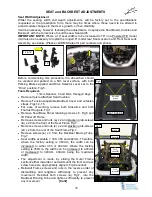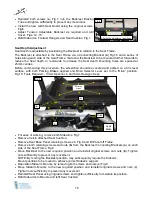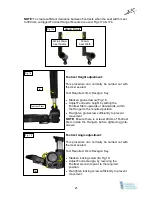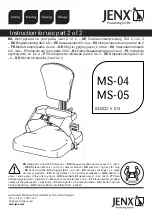
Electro-Magnetic Interference
The Invicta IPC-S and IPC-T model wheelchairs have been successfully tested in
accordance with international standards as to their compatibility with (EMI)
regulations. However, electromagnetic fields, such as those generated by radio and
television transmitters and cellular phones, can influence electrically powered
vehicles.
To reduce the danger of Malfunction due to Electromagnetic Interference, the
following points should be noted:-
Portable communication devices such as Radio Transceivers, Cellular Phones
and “Walkie
-
Talkie” devices should not be operated in close proximity to the
wheelchair, whilst the wheelchair is “Swiched On”
Avoid getting into close range of powerful radio and television transmitters.
Should the wheelchair be set into unintentional motion, or the electro magnetic
brakes released unexpectedly, “SWITCH OFF” the wheelchair immediately.
By adding electrical accessories to your wheelchair or modifying the original
equipment electrical system could change the wheelchair’s susceptibility to EMI.
Both Invicta models are currently able to provide an immunity level of 20V/m
which should protect against common sources of EMI.
Any occurances of unintentional movement of the wheelchair, including
uncontrollable directional control, or unexpected release of the electromagnetic
brakes, should be reported to your wheelchair supplier as soon as possible.
Environmental Conditions
Environmental conditions may affect the safety and performance of your power
wheelchair. Water and extreme temperatures are the main elements that can cause
damage and affect the power drive performance.
Rain, Sleet and Snow
—
If exposed
to water, the power drive system is
susceptible to damage to electrical or mechanical components. Water ingress
can cause electronic malfunction or promote premature corrosion of electrical
components.
DO NOT leave the wheelchair parked outside in the rain.
DO NOT park the wheelchair in a washroom/bathroom while taking a shower.
Temperature
—
Some parts of the power wheelchair are susceptible to changes
in temperature. The Controller can only operate within a temperature range
between 18°F (-8°C) and 122°F (50°C).
At extreme low temperatures, the batteries could freeze and the wheelchair may
not be able to operate. In extreme high temperatures it may operate at slower
speeds due to a safety feature within the Controller that prevents damage to the
drive motors and other electrical components.
Care must also be taken in hot weather. DO NOT leave the wheelchair parked
where it will be exposed to the sun, as the surfaces of the wheelchair can absorb
the heat and therefore become very hot to touch.
10
Summary of Contents for IPC-S
Page 1: ...Powered Wheelchairs Instructions for Use Models IPC S and IPC T Edition Two Feb 2013...
Page 2: ...2...
Page 41: ...41 USER NOTES...
Page 42: ...USER NOTES...
Page 43: ...USER NOTES...











































